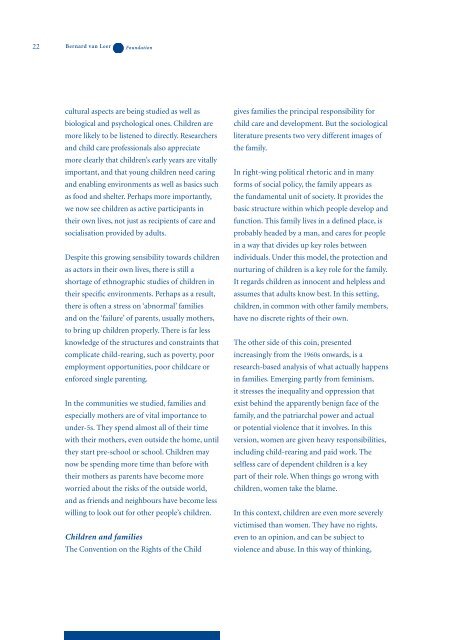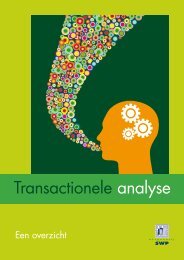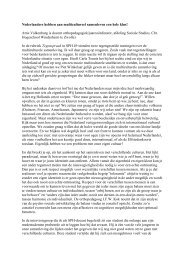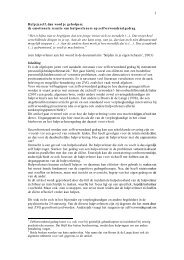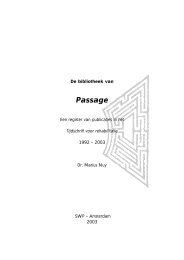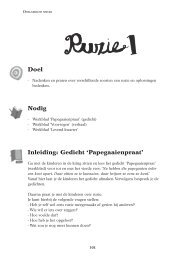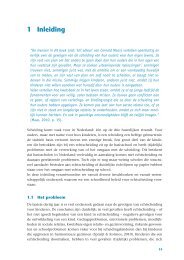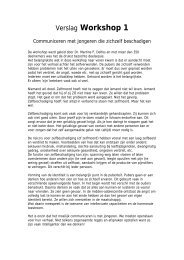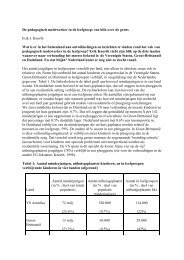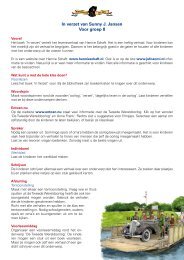Early childhood in the Caribbean - Bernard van Leer Foundation
Early childhood in the Caribbean - Bernard van Leer Foundation
Early childhood in the Caribbean - Bernard van Leer Foundation
Create successful ePaper yourself
Turn your PDF publications into a flip-book with our unique Google optimized e-Paper software.
22<br />
cultural aspects are be<strong>in</strong>g studied as well as<br />
biological and psychological ones. Children are<br />
more likely to be listened to directly. Researchers<br />
and child care professionals also appreciate<br />
more clearly that children’s early years are vitally<br />
important, and that young children need car<strong>in</strong>g<br />
and enabl<strong>in</strong>g environments as well as basics such<br />
as food and shelter. Perhaps more importantly,<br />
we now see children as active participants <strong>in</strong><br />
<strong>the</strong>ir own lives, not just as recipients of care and<br />
socialisation provided by adults.<br />
Despite this grow<strong>in</strong>g sensibility towards children<br />
as actors <strong>in</strong> <strong>the</strong>ir own lives, <strong>the</strong>re is still a<br />
shortage of ethnographic studies of children <strong>in</strong><br />
<strong>the</strong>ir specific environments. Perhaps as a result,<br />
<strong>the</strong>re is often a stress on ‘abnormal’ families<br />
and on <strong>the</strong> ‘failure’ of parents, usually mo<strong>the</strong>rs,<br />
to br<strong>in</strong>g up children properly. There is far less<br />
knowledge of <strong>the</strong> structures and constra<strong>in</strong>ts that<br />
complicate child-rear<strong>in</strong>g, such as poverty, poor<br />
employment opportunities, poor childcare or<br />
enforced s<strong>in</strong>gle parent<strong>in</strong>g.<br />
In <strong>the</strong> communities we studied, families and<br />
especially mo<strong>the</strong>rs are of vital importance to<br />
under-5s. They spend almost all of <strong>the</strong>ir time<br />
with <strong>the</strong>ir mo<strong>the</strong>rs, even outside <strong>the</strong> home, until<br />
<strong>the</strong>y start pre-school or school. Children may<br />
now be spend<strong>in</strong>g more time than before with<br />
<strong>the</strong>ir mo<strong>the</strong>rs as parents have become more<br />
worried about <strong>the</strong> risks of <strong>the</strong> outside world,<br />
and as friends and neighbours have become less<br />
will<strong>in</strong>g to look out for o<strong>the</strong>r people’s children.<br />
Children and families<br />
The Convention on <strong>the</strong> Rights of <strong>the</strong> Child<br />
gives families <strong>the</strong> pr<strong>in</strong>cipal responsibility for<br />
child care and development. But <strong>the</strong> sociological<br />
literature presents two very different images of<br />
<strong>the</strong> family.<br />
In right-w<strong>in</strong>g political rhetoric and <strong>in</strong> many<br />
forms of social policy, <strong>the</strong> family appears as<br />
<strong>the</strong> fundamental unit of society. It provides <strong>the</strong><br />
basic structure with<strong>in</strong> which people develop and<br />
function. This family lives <strong>in</strong> a def<strong>in</strong>ed place, is<br />
probably headed by a man, and cares for people<br />
<strong>in</strong> a way that divides up key roles between<br />
<strong>in</strong>dividuals. Under this model, <strong>the</strong> protection and<br />
nurtur<strong>in</strong>g of children is a key role for <strong>the</strong> family.<br />
It regards children as <strong>in</strong>nocent and helpless and<br />
assumes that adults know best. In this sett<strong>in</strong>g,<br />
children, <strong>in</strong> common with o<strong>the</strong>r family members,<br />
have no discrete rights of <strong>the</strong>ir own.<br />
The o<strong>the</strong>r side of this co<strong>in</strong>, presented<br />
<strong>in</strong>creas<strong>in</strong>gly from <strong>the</strong> 1960s onwards, is a<br />
research-based analysis of what actually happens<br />
<strong>in</strong> families. Emerg<strong>in</strong>g partly from fem<strong>in</strong>ism,<br />
it stresses <strong>the</strong> <strong>in</strong>equality and oppression that<br />
exist beh<strong>in</strong>d <strong>the</strong> apparently benign face of <strong>the</strong><br />
family, and <strong>the</strong> patriarchal power and actual<br />
or potential violence that it <strong>in</strong>volves. In this<br />
version, women are given heavy responsibilities,<br />
<strong>in</strong>clud<strong>in</strong>g child-rear<strong>in</strong>g and paid work. The<br />
selfless care of dependent children is a key<br />
part of <strong>the</strong>ir role. When th<strong>in</strong>gs go wrong with<br />
children, women take <strong>the</strong> blame.<br />
In this context, children are even more severely<br />
victimised than women. They have no rights,<br />
even to an op<strong>in</strong>ion, and can be subject to<br />
violence and abuse. In this way of th<strong>in</strong>k<strong>in</strong>g,


